Hierarchy of value orientations and locus of control for students with disabilities
Aннотация
Introduction. Inclusive higher education is based on the principle of humanity and addresses the personal values of students. The purpose of the research is to examine the hierarchy of values and locus of control for students with disabilities. Materials and methods. Sample: 93 students aged 17 to 28. Methods: Rokeach Value Survey and the Level of Subjective Control questionnaire. Statistical processing methods: Mann-Whitney U test, mean values ranking procedure, binomial distribution procedure. Results. Students with disabilities attach high importance to both interpersonal relationships and independence. Students with disabilities more often have an external locus of control, particularly in the spheres of health, failure, family and, above all, industrial relations, but there is a small group of respondents with an internal locus of control. Respondents attributed their achievements and interpersonal relationships to both themselves and external factors. Respondents with an internal locus of control place higher values on a financial security and entertainment, while respondents with an external locus of control place higher values of mature love and a happy family life. Conclusions. Students with disabilities have different values and types of locus of control. Comparative analysis revealed differences between students with congenital and acquired disabilities, as well as students with internal and external locus of control. The research expands the perception of students with disabilities. This will allow you to get closer to solving the urgent problems of their adaptation and interaction with teachers and students. The research is of interest to psychologists and educators.
Ключевые слова: inclusive education, students with disabilities, Rokeach Value Survey (RVS), Rotter's Locus of Control Scale, value orientations, hierarchy of values, locus of control
Introduction. One of the most important principles for the development of higher inclusive education is the principle of humanity of educational relations. This principle is approved and developed by scientists from various countries (Bratchenko, 2011, Bryan, Lindo and Weaver, 2015, Ryumshina, 1998, Ryumshina et al., 2022; Servant-Miklos, 2019, etc). It focuses on the value-semantic aspects of learning and is based on dialogic communication between the teacher and students (Arnold and Mundy, 2020, Rjumshina, 2000, Zhang L.J. and Zhang D., 2020).
The rejection of the disability medical model in favor of a social model that considers disability not as an individual defect, but as a cultural and historical phenomenon, caused a shift in the focus of researchers from developmental disorders and health defects to a holistic consideration of the life and personality for people with disabilities: the violation is secondary, the potential capabilities and vital needs of a person with disabilities are primary (Shakespeare, 2006). Understanding the values and meaning of the life of people with disabilities is very important for pedagogy (Kurlenkova, 2018). The axiological approach in education focuses on the personal values of students. These values serve as a key internal motivator for their educational pursuits, influencing how they perceive their learning, current happenings, and the people around them (Speck, 2011). The concept of locus of control is an essential psychological trait where an individual believes that their personal achievements and disappointments are the result of either self-influenced (internal) or situational (external) factors. This trait is recognized as one of the fundamental aspects that shape an individual's basic self-esteem (Judge, 1997, Salik Sengul, Kahraman and Ozcan Kahraman, 2021). It is the locus of control that is an important characteristic that reflects the value-semantic foundations of life and shows to what extent a person takes responsibility for his life and considers himself its owner. Therefore, the locus of control is directly related to the value experience of life, and therefore, to value orientations, therefore, in conjunction with them, it allows you to understand how responsibly a person relates to his life and how actively he realizes his life orientations.
Thus, the personality of a student with disabilities becomes the focus of attention for researchers studying the problems of inclusive education. In this case, there are a lot of researches devoted to the study of various psychological and socio-psychological properties, characteristics and features inherent in students with disabilities: personal potential, motivation to learn, creativity, locus of control, coping strategies, resilience, subjective well-being, self-actualization, etc. (Shelton and Gezer, 2023, Wamocho, Karugu and Nwoye, 2008). However, research that explores the values of students with disabilities, without differentiating by specific nosologies, remains limited.
If we turn to the publications presented in the scientific electronic library eLIBRARY.RU - the largest Russian information and analytical portal in the field of science, technology, medicine and education, it turns out that over the past 5 years (2019-2024), 2741 works have been published dedicated to the problems of students with disabilities. Of these, 1930 works on psychology, which may indicate that this topic is being actively developed. However, the request “value orientations of students with disabilities” reveals only 28 publications (Voroshilova and Chernyshova, 2019, Duda, Popovanova and Chizhakova, 2019, etc.). At the same time, 6 of them concern not the problems of students with disabilities, but the peculiarities of organizing work with them and training specialists who provide them with assistance (Sorokoumova and Larikova, 2022).
As for publications devoted to the locus of control of students with disabilities, only 5 publications were found, and in most cases it is not studied as the main variable (Tokarskaya and Ivanova, 2023, etc.).
For the sake of fairness, it should be noted that there are much more such publications in foreign science (Parveen and Batool, 2018, Chronopoulou, Stamovlasis and Papadopoulos, 2023, etc.), however, we are interested in the situation that is developing in the Russian pedagogical space, especially since value orientations and locus of control are largely socially determined.
Due to the significant role of values and locus of control in educational activities, it seems relevant for inclusive education to study these psychological properties for students with disabilities. Addressing the pressing issues of how students with disabilities engage with their peers in the educational environment can be facilitated by this approach. It paves the way for enhanced understanding and cooperation among all individuals involved in the learning process.
The purpose of the research is to study the hierarchy of values and determine the locus of control for students with congenital or acquired disabilities.
Materials and Methods. Subject of research: values and locus of control for students with disabilities.
Empirical object of the research: students with disabilities.
The sample consisted of 93 students with congenital and acquired disabilities (without taking into account specific nosology) aged 17 to 28 years from several universities.
Research methods and techniques. The study of values and locus of control was carried out using Rokeach Value Survey (RVS) and the “Level of Subjective Control”.
The Rokeach Value Survey is designed to study individual or group ideas about the system of significant values that determine the most general guidelines for an individual’s life. The test consists of two lists of 18 values - terminal, which reflect the main life aspirations of the individual, and instrumental, reflecting preferred behavior patterns, or means of achieving life goals (Rokeach, 1973). This study uses the adaptation of the Rokeach Value Survey in Russian, which was carried out by A. Goshtautas, A.A. Semyonov and V.A. Yadov. However, due to technical difficulties associated with the use of online questionnaires, we were forced to exclude some values from the analysis, resulting in the final lists of 16 terminal and 14 instrumental values.
The “Level of Subjective Control” questionnaire, rooted in J. Rotter's locus of control theory, seeks to identify whether a person is more inclined to ascribe their achievements or setbacks to factors within themselves, signifying an internal locus of control, or to outside influences, indicating an external locus of control. This questionnaire diagnoses locus of control in various situations and areas of life and consists of 7 scales: the scale of general locus of control, locus of control in the area of achievements, locus of control in the area of failures, locus of control in the area of family relations, locus of control in the area of working relations, locus of control in the area of interpersonal relations, as well as in the field of health and illness (Bazhin, Golynkina and Etkind, 1984).
The survey was conducted using the Internet service “Google Forms”. Respondents participated in the survey voluntarily at a convenient time for them.
Statistical processing was carried out using the one-sample Kolmogorov-Smirnov normal distribution test, the Mann-Whitney U test, the mean values ranking procedure, and the binomial distribution procedure.
Research results and Discussion. Analysis of values. To compile a group hierarchy of values, first it is necessary to calculate the arithmetic mean of the rank for each value according to the entire group data. The average ranks obtained in this way must be re-ranked in ascending order.
The ranking procedure made it possible to determine the group hierarchy of values for students with disabilities. Its results are shown in Table 1 and Table 2.
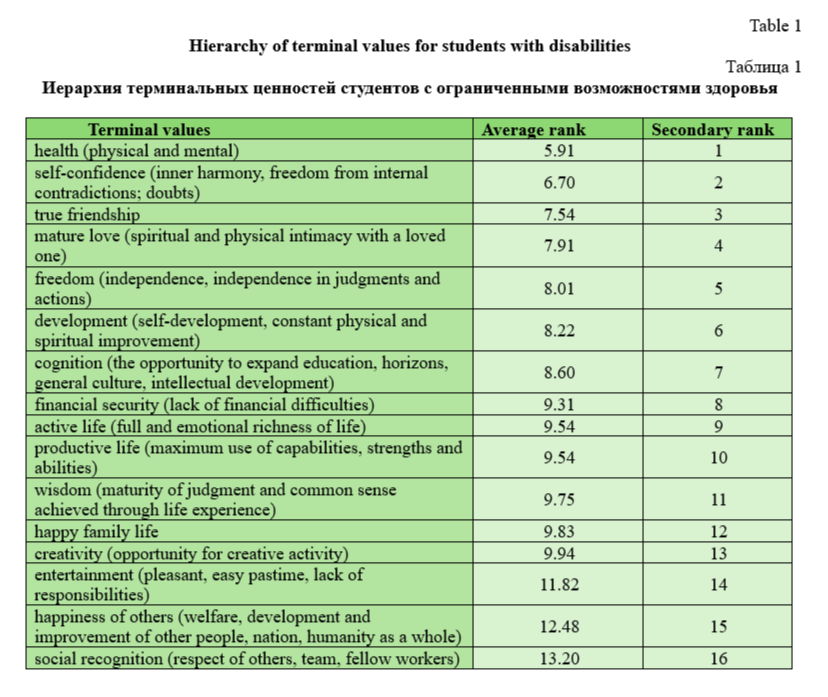 According to the data presented in Table 1, students with disabilities prioritize terminal values such as health, self-confidence, true friendship, mature love, freedom. Conversely, they place less emphasis on values like a happy family life, creativity, entertainment, the happiness of others, and societal recognition.
According to the data presented in Table 1, students with disabilities prioritize terminal values such as health, self-confidence, true friendship, mature love, freedom. Conversely, they place less emphasis on values like a happy family life, creativity, entertainment, the happiness of others, and societal recognition.
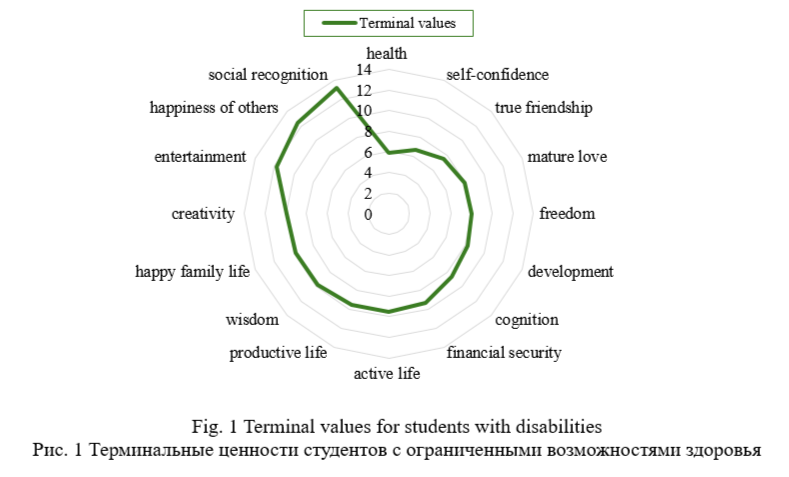
Fig. 1 also shows the results: the closer the value to the center of the chart, the higher the rank and high value it has for respondents.
The data in Table 2 and Figure 2 indicate that the most esteemed instrumental values among students with disabilities include broad-mindedness, responsibility, rationalism, sensitivity, and self-control. On the other hand, the values they regard as less important encompass courage in defending one’s opinions and views, cleanliness, efficiency in business, diligence, and ambition.
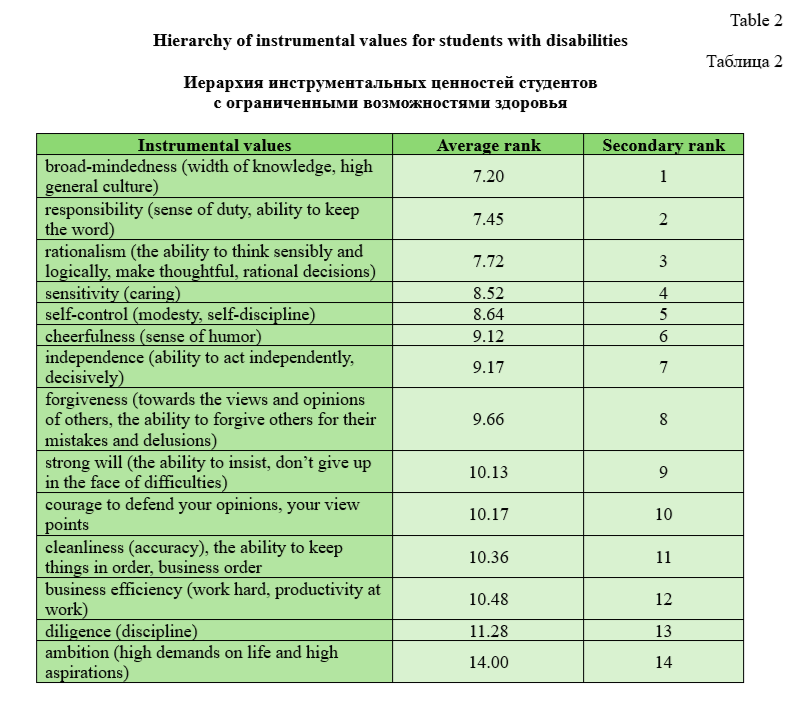
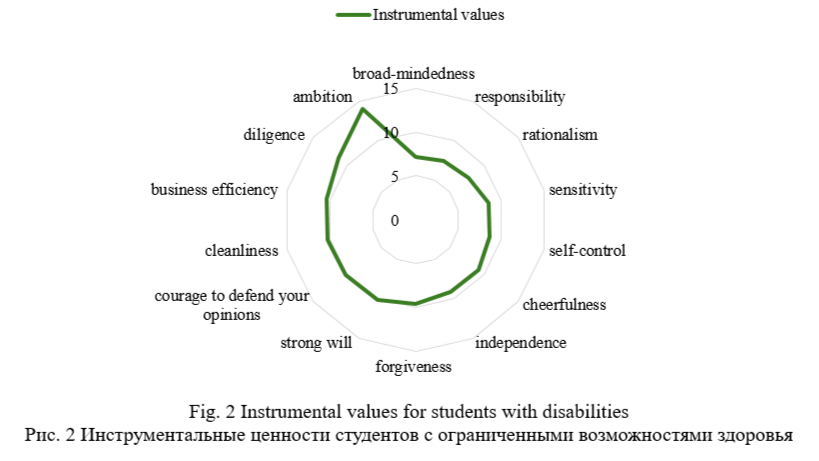
The outcomes of the ranking process enable us to compile a hierarchy of values that are most favored by the survey participants: health, self-confidence, happy family life, mature love, freedom, broad-mindedness, responsibility, rationalism, sensitivity, self-control. The data obtained indicate the importance for students with disabilities of both interpersonal relationships and the ability to independently organize their life activities.
Locus of control. After the initial processing, a predominance of externality became noticeable – both on the general scale and on the specific ones. However, a small group of internals also stood out.
Comparison of respondents on internality-externality was carried out using a binomial test. It was found that externals predominated in the sample (on the scale of general locus of control), and in the areas of failure, family relations, working relations and attitudes towards health, external locus of control also predominated, all differences having a high level of significance (p<0.01). In the realm of working relations, an external locus of control is notably prevalent, being evident in 95% of the respondents. No notable disparities were observed in the domains of achievements and interpersonal relationships, as depicted in Fig. 3.
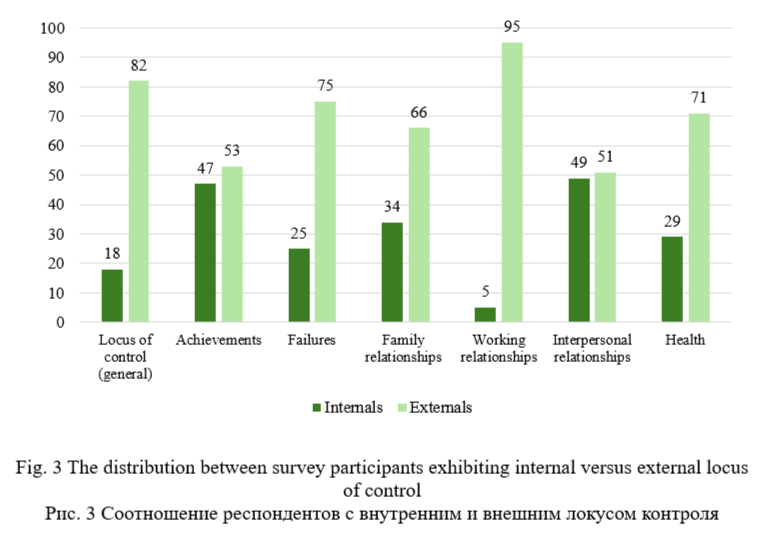
However, since not all respondents turned out to be externals, the sample was divided by type of locus of control, and internals were allocated as a separate group in order to identify how taking responsibility for one’s life affects the respondents’ values.
The group characterized by externality comprised 76 individuals who were determined to have an external locus of control based on the overall locus of control scale. On other scales (all except the industrial relations scale) they could have internality, but often the locus of control in all areas was external.
The group of internals included only 17 people. They had an internal locus of control identified on the general locus of control scale; it predominated in other scales as well, but it is interesting to note that in at least one of the scales an external locus of control was certainly present. It is noteworthy that the internal locus of control is most pronounced in the areas of achievement and interpersonal relationships − in each, only one respondent was found with an external locus of control.
Comparison of internal and external groups was carried out using the Mann-Whitney U test. Differences were found in terminal values: externals value love (p<0.05) and a happy family life (p<0.05) higher; internals value a financial security (p<0.05) and entertainment (p<0.05).
Thus, differences depending on the locus of control exist, but are not so significant. It is also difficult to say that internal personalities have values closer to humanistic ideals.
To summarize, students with disabilities are more likely to have an external locus of control: most of them do not feel that they are responsible for their lives, health, failures, family and work relationships, which for this age group are relationships at the university. Part of the idea that they have no influence on the course of events may be due to the presence of limited health capabilities caused by reasons beyond the individual's control, as an injury or congenital pathology; partly, and in the area of relationships - by the age and status-role position of students, who cannot influence parents and teachers (in the latter case, the confidence in the impossibility of influencing the situation is especially pronounced). At the same time, respondents attribute successes and achievements to both their own efforts and fortunate circumstances with approximately equal frequency; opinions are also shared regarding responsibility in interpersonal relationships, in which, as a rule, partners occupy the same status and role positions. The only difference we discovered in the value orientations of internals is a higher assessment of a materially secure life and entertainment.
Comparison of respondent groups with congenital and acquired disabilities. If a person has disabilities from birth or acquired them in early childhood, he gets used to life with limitations. If limited health capabilities are acquired during life, for example, as a result of injury, this event, as a rule, is experienced more acutely and painfully and divides life into “before” and “after”. Consequently, the study participants were categorized into two distinct cohorts: one consisting of 56 individuals with disabilities present from birth or early childhood, and another comprising 37 individuals who developed disabilities later in life. The main question that interests us is whether there is a correlation between the locus of control and the congenital or acquired nature of disability.
Group comparisons were made using the Mann-Whitney U test.
No differences were found in locus of control. This is probably explained by the fact that not only congenital, but also acquired disabilities arise, as a rule, not as a result of the individual actions, but independently and, apparently, it does not matter whether the person was limited in certain actions from birth or from a certain stage of life.
The following differences in the values structure were discovered. In the assessment of terminal-values, students with congenital disabilities assigned greater importance to health and entertainment (p=0.05), whereas those with disabilities acquired during their lifetime placed a higher value on mature love and a happy family life (p≤0.01). This suggests that for individuals with congenital disabilities, engaging in actual process of communication holds more significance, while for those who have acquired disabilities, establishing enduring romantic relationships is of greater importance.
Regarding instrumental values, the group with congenital disabilities values independence higher than the group with acquired disabilities (p<0.05), which is consistent with the high importance of health and may be associated with a longer experience of living with limitations. One can also assume a connection with the value of entertainment, justified by the fact that students with disabilities receive support in performing useful activities, but cannot count on help in the field of leisure and at the same time cannot independently organize the desired leisure time associated with activity and communication, which is often important for this age group.
 The results are more clearly shown in Fig. 4.
The results are more clearly shown in Fig. 4.

Thus, depending on whether disabilities are congenital or acquired during life, respondents value either health and entertainment (in the first case) or mature love and a happy family life (in the second case). Congenital disabilities also increase the desire for independence.
Among the characteristics of students with disabilities identified by other authors and matching our data, it is necessary to cancel disbelief in the ability to control the events of their lives (Kupriyanchuk, 2019) and a tendency to a passive position (Fominykh, 2014), which is consistent with the external locus of control, the predominance of which was established in this research.
The predominance of values associated with interpersonal interaction among students with disabilities, according to the authors, reflects a high need for close people, concern about relationships with them, as well as negative communication attitudes and fears associated with loneliness and misunderstanding (Kotera et al., 2021). Difficulties in establishing emotional contacts are also noted by Gariba and Awini (2023). Our results also demonstrate the high importance of interpersonal relationships, reflected in the hierarchy of values.
It should be emphasized that in most studies, students with disabilities are presented as a homogeneous group, but, for example, M.D. Konovalova (2013) demonstrated intra-group differences by identifying respondents with high and low levels of resilience among students with disabilities. In this research, students with disabilities are also presented as a group with internal differences.
Limitations and future directions. The objective of this study was not to conduct a comparative analysis of the values and locus of control of students with disabilities and students without health problems. However, the authors are aware that such a comparison will make it possible to more clearly understand the problems of students with disabilities and may become a prospect for further research.
Conclusions. Students with disabilities represent a fairly diverse group with different values and locus of control types.
The values of students with disabilities are heterogeneous. The most preferred values are: health, self-confidence, true friendship, mature love, freedom, broad-mindedness, responsibility, rationalism, sensitivity, self-control. Thus, respondents attach high importance to both interpersonal relationships and the ability to independently organize their life activities.
Students with congenital disabilities value health, entertainment and independence rated higher; students with acquired disabilities value rated mature love and a happy family life.
Students with disabilities are more likely to have an external locus of control, but there is a small group of respondents with an internal locus of control. Most respondents do not feel that they are responsible for their lives, health, failures, family and, especially, working relations. However, respondents place responsibility for achievements and interpersonal relationships both on themselves and on external factors.
Respondents with an internal locus of control place a higher importance on financial security and entertainment, whereas those with an external locus of control prioritize the significance of mature love and a happy family life.
Thus, the study demonstrates that it is important to examine the values and locus of control in aggregate: this gives more complete results, allowing you to understand the deep foundations of the personality of students with disabilities. This understanding is necessary for building relationships in the educational process, for organizing formal and informal interaction of students with disabilities with other students and teachers, as well as for creating programs for their psychological support.

















Список литературы
Bratchenko, S.L. (2011), Gumanitarnaya ekspertiza obrazovaniya [Humanitarian expertise of education], Obrazovatel`ny`j centr “Uchastie”, St. Petersburg, Russia.
Duda, I.V., Popovanova, N.A. and Chizhakova, G.I. (2019), Aksiologicheskaya napravlennost modernizatsii rossiyskoy obrazovatelnoy sistemy [Axiological orientation of modernization of the Russian educational system], Krasnoyarsky gosudarstvenny pedagogichesky universitet im. V.P. Astafieva, Krasnoyarsk, Russia.
Fominykh, E.S. (2014), “Life values as psychological indicators of victimhood of students with disabilities”, Aktualnye problemy gumanitarnykh i estestvennykh nauk, 2(2), 268-270. (In Russian).
Konovalova, M.D. and Shchetinina, E.B. (2013), Psikhologo-pedagogicheskoe soprovozhdenie studentov s ogranichennymi vozmozhnostyami zdorovya [Psychological and pedagogical support of students with disabilities], Saratov University Publishing House, Saratov, Russia.
Kupriyanchuk, E.V. (2019), “Zhiznennye smysly i tsennostnye orientatsii u studentov s ogranichennymi vozmozhnostyami zdorovya“ [Life meanings and value orientations in students with disabilities], Pedagogicheskoe vzaimodeistvie: vozmozhnosti i perspektivy, Materialy I nauchno-prakticheskoi konferentsii s mezhdunarodnym uchastiem, 799-803. (In Russian).
Kurlenkova, A.S. (2018), “Invalidnost kak effekt praktik: popytka novoy kontseptualizatsii” [Disability as an effect of practices: an attempt at a new conceptualization], in: A.S. Kurlenkova, E.E. Nosenko-Shtejn (ed.), MBA Publishing House LLC, Moscow, Russia.
PsyLab.info (2009-2024), “Uroven subiektivnogo kontrolya“ [Level of subjective control], available at: https://psylab.info (Accessed 20 June 2024).
Ryumshina, L.I. (1998), “Humanistic psychology in Russia: past and present”, Prikladnaya psihologiya, 5, 1-10. (In Russian).
Ryumshina, L. (2000), “Empirical study of pedagogical activity styles”, Voprosy Psikhologii, 1, 148-149. (In Russian).
Sorokoumova, S.N. and Larikova, E.N. (2022), “Semantic-life orientations in the personality structure of future defectologists”, Vestnik Mininskogo universiteta, 10, 1(38). https://doi.org/10.26795/2307-1281-2022-10-9. (In Russian).
Tokarskaya, L.V. and Ivanova, A.A. (2023), “The study of the resilience of higher education students with sensory impairments”, Uchenye zapiski Krymskogo federalnogo universiteta V.I. Vernadskogo. Sotsiologiya. Pedagogika. Psikhologiya, 9 (75), 4, 164-174. (In Russian).
Voroshilova, O.L. and Chernyshova O.V. (2019), “Social and psychological aspects of teaching students with disabilities”, Izvestiya Yugo-Zapadnogo gosudarstvennogo universiteta. Seriya: Lingvistika i pedagogika, 9, 1(30), 152-159. (In Russian).
Arnold, J. and Mundy, B. (2020), “Praxis pedagogy in teacher education”, Smart Learning Environments, 7, 8, 06 March. https://doi.org/10.1186/s40561-020-0116-z (In UK).
APA PsycNet (2019), “Rokeach Value Survey (RVS)”, available at: https://psycnet.apa.org/doiLanding?doi=10.1037%2Ft01381-000 (Accessed 4 June 2024).
Bryan, V. D., Lindo, J. and Weaver, S. (2015), “Using Carl Rogers' Person-Centered Model to Explain Interpersonal Relationships at a School of Nursing”, Journal of Professional Nursing, 31 (2), 141-148. (In USA).
Chronopoulou, E., Stamovlasis, D., and Papadopoulos, K. (2023). “Self-esteem and locus of control of individuals with visual impairments before and during the COVID-19 pandemic: A latent class analysis”, British Journal of Visual Impairment, 42(3). https://doi.org/10.1177/02646196231183892. (In USA).
Gariba, A. and Awini, A. (2023), “Peer relationships and interaction between students with visual impairments and their sighted peers at Sirigu Senior High School in Ghana”, BJSE, 50 (3), 355-378. https://doi.org/10.1111/1467-8578.12447. (In UK).
Judge, T.A. (1997), “The dispositional causes of job satisfaction: A core evaluations approach“, Research in Organizational Behavior, 19, 151-188. (In UK).
Kotera, Y., Chircop, J., Hutchinson, L. et al. (2021), “Loneliness in online students with disabilities: qualitative investigation for experience, understanding and solutions”, Int J Educ Technol High Educ, 18 (64). https://doi.org/10.1186/s41239-021-00301-x. (In Netherlands).
Parveen, Z., and Batool, B. (2018), “Value priorities among deaf and hearing adolescents in Pakistan: a comparative study”, International Journal of Inclusive Education, 24(1), 50-57. https://doi.org/10.1080/13603116.2018.1450455. (In UK).
Ryumshina, L., Belousova, A., Berdyanskaya, Y. and Altan-Avdar, I. (2022), “Symmetrical and asymmetrical approaches to communication in education in distance learning”, Lecture Notes in Networks and Systems, 247, 471-481. (In Switzerland).
Salik Sengul, Y., Kahraman, T. and Ozcan Kahraman, B. (2021), “Problematic Facebook use behavior and locus of control in physiotherapy students”, Bull Fac Phys Ther, 26 (13). https://doi.org/10.1186/s43161-021-00031-1. (In Egypt).
Servant-Miklos, V.F.C. (2019), “From Flexner to Rogers: An Inquiry into the Intellectual Origins of Problem-Based Learning at McMaster University Medical School”, Health Professions Education, 5, 2, 93-102. (In Saudi Arabia).
Shakespeare, T. (2006), The social model of disability, in Davis, L.J. (ed.), The Disability Studies Reader, 2nd ed., 197-204. Routledge, Taylor & Francis Group, New York, London, United States of America, United Kingdom.
Shelton, A. and Gezer, T. (2023), “Investigating the educational experiences of students with disabilities during the COVID-19 school disruption: an international perspective”, Large-scale Assess Educ, 11 (34). https://doi.org/10.1186/s40536-023-00183-7. (In USA).
Speck, O. (2011), “Wage es nach wie vor, dich deines Verstandes zu bedienen! Ideologische Implikationen einer Schule für alle”, Zeitschrift für Heilpädagogik 62 (Jg.), 3, 84-91. (In Germany).
Wamocho, F.I., Karugu, G.K. and Nwoye, A. (2008), “GUIDANCE: Development of a guidance programme for students with special educational needs in Kenya: a study on personal orientation”, BJSE, 35 (I.4), 221-229. https://doi.org/10.1111/j.1467-8578.2008.00399.x. (In UK).
Zhang, L.J. and Zhang, D. (2020), “Dialogic discussion as a platform for constructing knowledge: student-teachers’ interaction patterns and strategies in learning to teach English”, Asian. J. Second. Foreign. Education, 5 (22). https://doi.org/10.1186/s40862-020-00101-2. (In Germany).